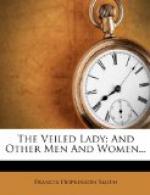“Yes; had him for years.”
Instantly the absurdity of the companionship broke upon me. What possible comfort, I thought, could a man like the captain take in so tiny a creature? It was the lion and the mouse over again—the eagle and the tom-tit—the bear and the rabbit. He must have noticed my surprise and amusement, for he added with a smile:
“Must have something. Gets pretty lonesome sometimes when you have no wife nor children, and there are none anywheres for me.” He had withdrawn his fingers now, and was buttoning his coat close about his broad chest, his eyes still on the bird that was splitting its little throat in a burst of song.
“But he’s so small,” I laughed. “I should think you’d have a dog—seems nearer your size.”
I once saw a man struck by a spent bullet. I remember the sudden pallor, the half gasp, and the expression of pain that followed. Then the man uttered a cry. The same expression crossed the captain’s face, but there was no gasp and no cry; only a straightening of the lips and a tightening-up of the iron jaw. Then, without a word of any kind in answer, he caught up his cap, swung back the door, and with the wind full on his chest, breasted his way to the bridge.
When the door swung open a moment later it closed on the first officer—a square, thick-set, round-headed man, with mild blue eyes set in a face framed by a half-circle of reddish-brown whiskers, the face tanned by twenty-five years of sea service, fifteen of them with Captain Bogart.
“Getting soapy,” he said; “wind haulin’ to the east’ard. Goin’ to have a nasty night.” As he spoke he stripped off his tarpaulins, hung them to a hook in the chart-room, and wiping the salt grime from his face with his coat cuff, took the captain’s empty seat at the table.
I knew by the captain’s silent departure that I had made a break of some kind, but I could not locate it. Perhaps the first officer might explain.
“Captain lost his wife, didn’t he?” I asked, moving my chair to make room.
“No—never had one.” He leaned forward and filled one of the empty cups. “Why did you think so?”
“Well, more from the tone of his voice than anything else. Some trouble about it, wasn’t there?”
“There was. His sweetheart was burned to death ten years ago—lamp got upset.” These men are direct in their speech. It comes from their life-long habit of giving short, crisp, meaning orders. He had reached for the sugar now, and was dropping the lumps slowly into his cup.
“That explains it, then,” I answered. “We were talking about the bird over there, and he said a man must have something to love, being without wife or children, and then I told him a big man like himself, I should think, would rather have a dog—”
The first officer put down his cup, jerked his body around, and said, his blue eyes looking into mine:
“You didn’t say that, did you?”




